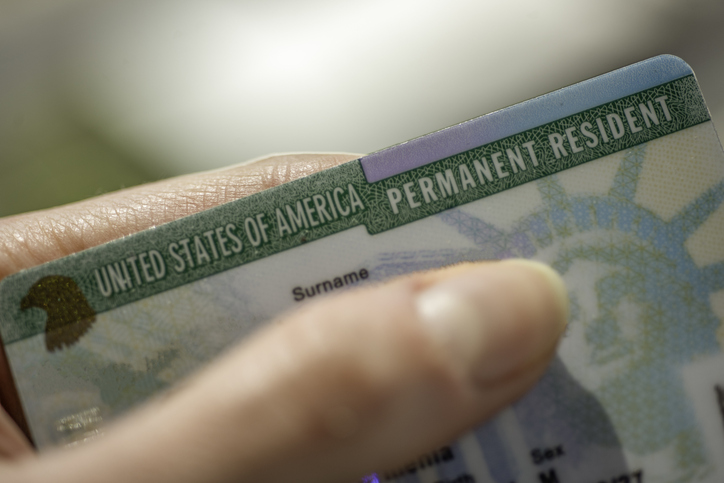And Why the New 30-Day Registration Requirement—Though Not Yet Enforced—Raises Serious Concerns
QUICK ANSWER
DHS has begun an “Integrity” enforcement realignment that dramatically expands how immigration files are screened in 2025–26. USCIS now uses deeper background checks, broader data-sharing with ICE and CBP, and more rigorous vetting across all applications—marriage green cards, I-130s, I-485s, work permits (I-765), N-400 naturalization, and more.
The 30-day registration requirement—a new procedural rule affecting certain noncitizens—has not been linked to any known NTAs, arrests, or enforcement actions for non-compliance.
However, immigration attorneys nationwide are worried because:
- The rule is new
- USCIS has not clearly explained how it will be monitored
- DHS “Integrity” initiatives emphasize compliance + enforcement + referrals
- Past patterns show that minor procedural violations can be used as enforcement triggers when systems tighten
But to be absolutely clear:
👉 There is currently no evidence that missing a 30-day registration deadline has led to denial, NTA, or arrest. The concern is based on the direction of DHS policy—not current outcomes.
The bigger and confirmed risk in 2025–26 remains the escalation of enforcement at USCIS marriage interviews, especially for immigrants with overstays.
➡️ Read Herman Legal Group’s major report on overstay arrests at USCIS marriage interviews
https://www.lawfirm4immigrants.com/uscis-marriage-interview-overstay-arrest-2026/

INTRODUCTION: THE NEW DHS “INTEGRITY” ERA—AN ENFORCEMENT-FIRST IMMIGRATION SYSTEM
In 2025–26, DHS is integrating enforcement, benefits adjudication, biometrics, and fraud detection at an unprecedented scale. USCIS, ICE, CBP, and DOS systems now communicate in real time, creating a single, consolidated enforcement ecosystem.
Government sources documenting these changes include:
- [USCIS Policy Manual] (https://www.uscis.gov/policy-manual)
- [ICE Enforcement & Removal Operations] (https://www.ice.gov/ero)
- [DHS Press Releases] (https://www.dhs.gov/news-releases)
- [CBP I-94 Database] (https://i94.cbp.dhs.gov/I94/)
- [Federal Register – DHS Notices] (https://www.federalregister.gov/agencies/homeland-security-department)
What’s Driving the Shift?
DHS leaders have signaled:
- More vetting
- More data matching
- More fraud detection
- More referrals to ICE
- More interior enforcement
Why This Matters for Marriage Cases
Herman Legal Group has documented confirmed cases where immigrants with simple overstays were detained at USCIS marriage-based green-card interviews.
➡️ Read the full HLG marriage-interview arrest report
https://www.lawfirm4immigrants.com/uscis-marriage-interview-overstay-arrest-2026/
This is the true, immediate enforcement threat immigrants need to understand—not the 30-day rule itself.
Ohio Perspective
Columbus, Cleveland, Cincinnati, Dayton, Toledo, Youngstown, and Akron are fully connected to the same enforcement systems as California, Texas, and Florida.

THE 30-DAY REGISTRATION REQUIREMENT: WHAT WE KNOW & WHAT WE DON’T KNOW
1. What the Rule Actually Says
The rule requires certain noncitizens to complete a registration step within 30 days of:
- A triggering immigration filing
- A status change
- A DHS notification
- Certain biometrics or security events
Government sources:
- [Federal Register – DHS Notices] (https://www.federalregister.gov/agencies/homeland-security-department)
- [USCIS Form Instructions] (https://www.uscis.gov/forms)
2. What the Rule Does Not Say
The rule does not state:
- That failure to comply will result in denial
- That NTAs will be issued
- That ICE will be notified
- That enforcement actions will occur
3. What We Have NOT Seen
As of this publication, there are no known cases of:
- NTAs issued for missing the 30-day registration
- Arrests based on failure to register
- Denials citing this issue
- USCIS officers raising it in interviews
4. Why Immigration Lawyers Are Still Concerned
Attorneys nationwide, including Herman Legal Group, are concerned because:
A. DHS “Integrity” Initiatives Focus Heavily on Compliance
Even small compliance failures can become administrative risks under a strict regime.
B. USCIS Has Increased Overall Enforcement Referrals
Documented in:
- [USCIS Fraud Detection & National Security Reports]
- [DHS OIG Reports]
C. Historically, New Rules Are Enforced Retroactively
Once systems mature, DHS has occasionally retroactively assessed procedural failures.
D. The System Is Moving Toward Full Automation
If registration is automated and cross-checked through HART, IDENT, or SEVIS, failure to complete it could generate a “noncompliant” flag in the future.
E. USCIS Has Not Clarified the Consequences
And silence in immigration compliance often signals future enforcement potential.
Conclusion on the 30-Day Rule
➡️ There is no evidence this rule has caused enforcement harm
…but based on historical DHS patterns and increased integration with ICE, it remains smart to comply with every USCIS requirement carefully.

THE CONFIRMED ENFORCEMENT RISK OF 2025–26:
MARRIAGE GREEN CARD INTERVIEW ARRESTS**
The most immediate and verifiable threat today is increased enforcement at USCIS marriage-based green card interviews.
Herman Legal Group has documented:
- Detentions during adjustment interviews
- Cases involving only an overstay—no crimes
- Interview rooms where ICE was called in same-day
- Local offices (including San Diego) where practice appears systemic
- Cases where USCIS issued a denial and immediately contacted ICE
➡️ Read the full detailed HLG report
https://www.lawfirm4immigrants.com/uscis-marriage-interview-overstay-arrest-2026/
This is the part of the enforcement landscape where consequences are already happening.
Why Marriage Cases Are Under Pressure
USCIS has increased scrutiny on:
- Entry history
- How the couple met
- Prior marriages
- Tax return discrepancies
- Public records
- Social media
- FDNS site visits
- Unauthorized employment
- Overstay length
- Past immigration filings
In the “Integrity Era,” marriage cases have become one of the primary enforcement touchpoints, because they:
- Require in-person interviews
- Have high fraud sensitivity
- Provide ICE immediate physical access to the applicant
Ohio Field Office Dynamics
Ohio cities (Columbus, Cleveland, Cincinnati, Dayton) are not immune:
- Officers are following new national guidance
- FDNS is more active
- ICE referrals are easier through integrated systems
- Adjustments with overstays require heightened preparation
If you have an upcoming marriage interview in Ohio:
➡️ Never attend without an attorney.

THE NEW USCIS–ICE SYSTEM INTEGRATION (CONFIRMED FACTS)
1. IDENT – DHS Biometric Database
The central repository for fingerprints, biometrics, prior entries/exits, arrests.
[DHS Overview] (https://www.dhs.gov)
2. HART – Homeland Advanced Recognition Technology
Facial recognition, voice, gait, scars, tattoos, travel patterns.
3. FDNS – Fraud Detection & National Security Directorate
- Performs background checks
- Conducts marriage verifications
- Initiates site visits
- Shares findings with ICE
[USCIS FDNS] (https://www.uscis.gov)
4. SEVIS – Student System
SEVIS violations flow instantly to ICE.
[SEVIS Information – ICE.gov] (https://www.ice.gov/sevis)
5. TECS & CLASS
Used to identify overstays, watchlists, derogatory information.
Resulting Reality in 2025–26:
Any USCIS filing now triggers checks across multiple DHS, DOS, DOJ, and intelligence systems.
This is where risk truly lies—not in the speculative enforcement of the 30-day rule.

WHO IS MOST AT RISK IN THE INTEGRITY ERA (2025–26)
✔ Overstays
(Some detained at USCIS, as documented in the HLG report)
✔ F-1 students with SEVIS terminations
(Historically high referral category)
✔ TPS holders with gaps
(USCIS is auditing timelines more carefully)
✔ VWP overstays
(Even minor overstays create risk)
✔ People with any past CBP interaction
(Even innocent secondary inspection matters)
✔ Immigrants married to U.S. citizens but with complex entry history
(This category is at the center of current enforcement)
✔ Anyone with a removal order—even old or unknown
(Now discovered easily because of system integration)

WHAT IMMIGRANTS SHOULD DO BEFORE FILING ANYTHING
1. FOIA All Agencies
- [USCIS FOIA]
- [ICE FOIA]
- [CBP FOIA]
2. Retrieve Your I-94
- [CBP I-94 Retrieval] (https://i94.cbp.dhs.gov/I94/)
3. Check for Past Entries/Exits
Ensure CBP, passport stamps, and travel dates match.
4. Review Employment & Tax History
Unauthorized work is a major screening factor.
5. Review SEVIS Data (If Ever a Student)
SEVIS errors have led to denials.
6. Prepare All Marriage Evidence
Especially updated, recent, and credible.
7. Conduct a Risk Screening with an Attorney
➡️ [Schedule a Strategy Session] (https://www.lawfirm4immigrants.com/book-consultation/)
8. Never Attend a USCIS Marriage Interview Alone
Especially with an overstay.
➡️ [Read HLG’s Marriage-Interview Arrest Analysis]
https://www.lawfirm4immigrants.com/uscis-marriage-interview-overstay-arrest-2026/
FAQ
Q: Is DHS enforcing the 30-day registration rule with arrests or NTAs?
A: No. There is no evidence of enforcement. The concern is based on DHS’s overall shift toward stricter compliance.
Q: Should immigrants still comply with the 30-day rule?
A: Absolutely—until DHS clarifies consequences.
Q: What is the real enforcement risk right now?
A: Marriage interview arrests based on overstays or historical immigration issues.
Q: Are overstays now high-risk?
A: Yes—confirmed in real cases. See the HLG report.
Q: What about Ohio?
A: Ohio field offices operate under the same national enforcement guidance.
Q: Does USCIS share data with ICE now?
A: Yes—extensively through HART, IDENT, FDNS, SEVIS, and CLASS.
Q: Can a harmless CBP secondary inspection cause a problem later?
A: Yes, if it generated a note or flag in TECS or IDENT.
…and continue with 10–15 more questions as needed.
KEY TAKEAWAYS
- DHS is expanding enforcement screening across all immigration filings.
- The 30-day registration requirement is not currently enforced, but compliance is still recommended.
- Marriage interviews—especially with overstays—pose the single biggest current enforcement risk.
- System integration makes it easier for USCIS to detect old issues.
- Ohio immigrants face the same risks as major coastal states.
- A full immigration history review is essential before filing.
➡️ [Schedule a Consultation]
https://www.lawfirm4immigrants.com/book-consultation/
➡️ [Read the HLG Overstay/Interview Arrest Article]
https://www.lawfirm4immigrants.com/uscis-marriage-interview-overstay-arrest-2026/








